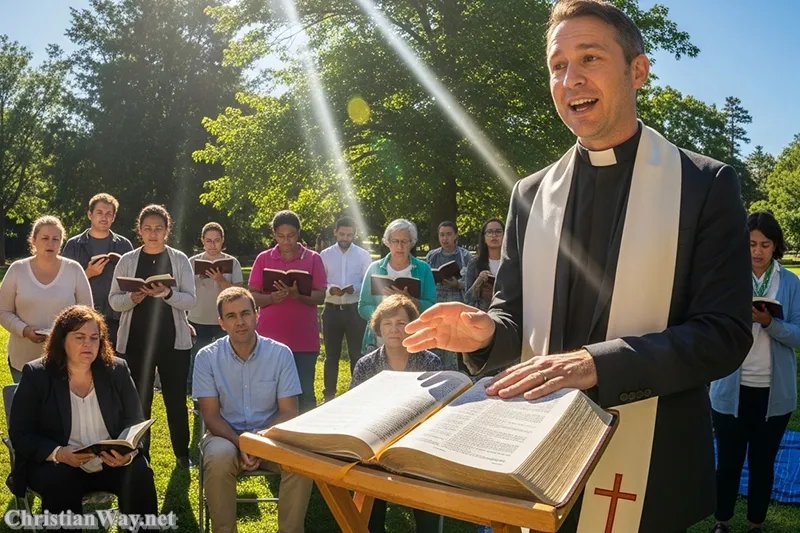Dear friends in Christ,
Within the great breadth of the Anglican tradition, there are many streams of thought, prayer, and devotion that together form a beautiful and living witness to Christ. Among them, the Evangelical Anglican tradition stands as a voice deeply rooted in Scripture, devoted to personal conversion, and animated by a burning desire to proclaim the Gospel of Jesus Christ to all nations. It is a movement that seeks not to divide the Church but to renew her life through the simple and powerful call of Christ: “You must be born again” (John 3:7).
The Evangelical Anglican heart beats with passion for the Word of God, reverence for the Cross of Christ, and reliance on the grace of the Holy Spirit. It carries within it the same zeal that animated the Reformers, the same longing for renewal that stirred the Wesley brothers, and the same missionary impulse that has taken the Gospel to the ends of the earth.

Let us reflect, then, on what it means to be Evangelical within the Anglican fold — not as a label or faction, but as a living expression of discipleship that seeks to love, serve, and follow Christ faithfully in the world.
The Centrality of Scripture
At the heart of the Evangelical Anglican vision lies a deep and abiding trust in the authority of Holy Scripture. For them, the Bible is not merely a historical document or a collection of moral sayings; it is the living Word of God, inspired by the Holy Spirit and sufficient for teaching, correction, and growth in righteousness (2 Timothy 3:16).
This conviction flows from the Reformation principle of sola Scriptura — that Scripture contains all things necessary for salvation. Yet Evangelical Anglicans read the Bible not in isolation, but within the prayerful rhythm of the Church. They hold to the Book of Common Prayer, which itself is saturated with biblical language, shaping the heart and voice of Christian prayer.
A Word That Speaks to the Heart
For Evangelical Anglicans, Scripture is not only to be studied; it is to be heard and obeyed. It calls the believer to a personal encounter with God’s truth and grace. The Word convicts, comforts, and converts. As John Stott, one of the most beloved Evangelical Anglicans of the 20th century, wrote: “The Bible is God’s word written — to read it is to hear God’s voice.”
Through preaching, teaching, and daily reading, Evangelical Anglicans have long emphasized biblical literacy — not as an academic pursuit, but as a way of knowing and loving the Lord.
The Call to Personal Conversion
Another defining mark of Evangelical Anglicanism is the insistence on the necessity of conversion — the inner turning of the heart toward Christ. This conviction echoes the words of Jesus to Nicodemus: “No one can see the kingdom of God unless they are born again” (John 3:3).
To be “born again” is not to join a movement, but to enter into a living relationship with Christ, where faith becomes personal, not inherited; alive, not formal. Evangelical Anglicans speak of this as “heart religion” — a faith that transforms the whole person.
Grace, Not Works
In the Evangelical understanding, salvation is by grace alone, through faith alone, in Christ alone. Good works are the fruit, not the root, of salvation. This emphasis does not diminish the sacraments or the Church’s worship but deepens them — for the believer who knows he has been saved by grace approaches the altar, the font, and the Word with deeper gratitude and awe.
This conviction fueled the preaching of great Anglican evangelists such as John Wesley and George Whitefield, whose ministries sparked revivals across England and the American colonies. Their message was simple and urgent: Christ died for you — repent and believe the Gospel.
The Cross at the Center
In Evangelical Anglican life, the Cross of Christ stands at the center of faith. It is more than a symbol — it is the very heart of salvation, where love and justice meet. The Cross reveals both the depth of human sin and the immeasurable love of God.
As the hymn declares, “When I survey the wondrous cross on which the Prince of Glory died, my richest gain I count but loss, and pour contempt on all my pride.”
Evangelical Anglicans cherish this theology of the Cross — often called penal substitutionary atonement — as a reminder that Christ bore our sins and, in doing so, reconciled us to God. This belief is not cold doctrine, but a source of deep personal devotion and missionary passion. For if Christ died for all, then all must hear the Good News.
The Cross and the Mission
This focus on the Cross naturally overflows into missionary zeal. The 18th and 19th centuries saw Evangelical Anglicans leading missionary movements across Africa, Asia, and the Americas. Organizations such as the Church Missionary Society (CMS) were born from this conviction that the world must know the Savior who died and rose again.
The same spirit continues today, as Evangelical Anglicans engage in global mission, social renewal, and evangelization — proclaiming Christ in word and deed.
The Work of the Holy Spirit
Evangelical Anglicans also emphasize the active presence of the Holy Spirit in the life of every believer. The Spirit brings the Word to life, empowers prayer, and produces the fruits of holiness.
While Anglicanism as a whole affirms the work of the Spirit, Evangelicals often highlight the personal and transformative power of the Spirit in conversion, sanctification, and daily discipleship.
A Living Faith, Not a Cold Religion
This Spirit-led vitality guards against the danger of nominal Christianity — the outward appearance of faith without inward renewal. The Spirit makes the believer’s heart a temple of God, conforming it to the image of Christ. As St. Paul writes, “If anyone is in Christ, he is a new creation” (2 Corinthians 5:17).
Evangelical Anglicans therefore seek a living faith — one that is prayerful, humble, and courageous in witness.
Worship That Flows from the Word
While Evangelical Anglicans deeply love the liturgy of the Church, they approach worship as a means to encounter God through Word and Spirit. The preaching of Scripture is often the heart of their gatherings, accompanied by heartfelt hymns and prayers of confession and thanksgiving.
The Book of Common Prayer, rich in biblical truth and poetic reverence, remains central to their devotion. Yet their worship is never merely formal; it is joyful and evangelistic, designed to lead the congregation into living communion with the risen Lord.
As Charles Simeon, a great Evangelical Anglican preacher, once said, “The end of all preaching is to bring men to Christ and keep them there.”
A Heart for Mission and Justice
The Evangelical Anglican movement has always been outward-looking — seeing the world through the eyes of the Savior who came “to seek and to save the lost.” This mission extends beyond preaching to acts of compassion, justice, and mercy.
Faith in Action
Evangelical Anglicans have been leaders in movements for social reform, education, and abolition of slavery. Figures such as William Wilberforce, whose faith inspired the abolition of the slave trade, and Hannah More, who championed education for the poor, embody this commitment to living faith in action.
For them, evangelism and social action are not opposites but partners — both flowing from the same Gospel truth: that Christ came to redeem the whole person and renew the world.
Unity Within Diversity
The Evangelical Anglican identity is one thread in the larger tapestry of Anglicanism, which also includes Catholic, Broad Church, and Charismatic expressions. Though distinct in emphasis, Evangelical Anglicans remain faithful to the historic Creeds, the sacraments, and the episcopal structure of the Church.
Their calling is not to withdraw from the broader Church but to renew her from within, reminding all believers that the heart of faith is not ritual or heritage alone, but the living Lord Jesus Christ.
As Archbishop William Temple once said, “Evangelism is to so present Jesus Christ in the power of the Holy Spirit that men shall come to put their trust in God through Him.”
Living the Evangelical Anglican Way Today
To live as an Evangelical Anglican today is to be a person of Scripture, prayer, and mission. It is to love the Church while longing for her continual renewal in the Holy Spirit.
It means:
- To read the Bible daily with an open heart.
- To pray not only with lips but with life.
- To share the Gospel with humility and courage.
- To live out justice, mercy, and holiness in the world.
It is a way of faith that balances conviction with compassion, doctrine with devotion, and truth with grace.
Reflect and Pray
Dear brothers and sisters, the Evangelical Anglican spirit reminds the Church that every generation must rediscover the Gospel anew — not as an idea, but as a living encounter with Jesus Christ, who saves, heals, and transforms.
May we too hear His call, as once heard by the fishermen on the Sea of Galilee: “Follow me.” And may our lives, like theirs, become a witness to the light that no darkness can overcome.
Prayer:
Lord Jesus Christ, Word made flesh and Savior of the world,
Renew in us a love for Your truth and a passion for Your Gospel.
Make our hearts alive with Your Spirit, our minds firm in Your Word,
and our hands ready to serve the least of these.
Grant that the Church may ever be renewed in Your grace,
and that our faith may shine as a light to all who seek You.
Amen.
— Fr. John Matthew, for Christian Way





